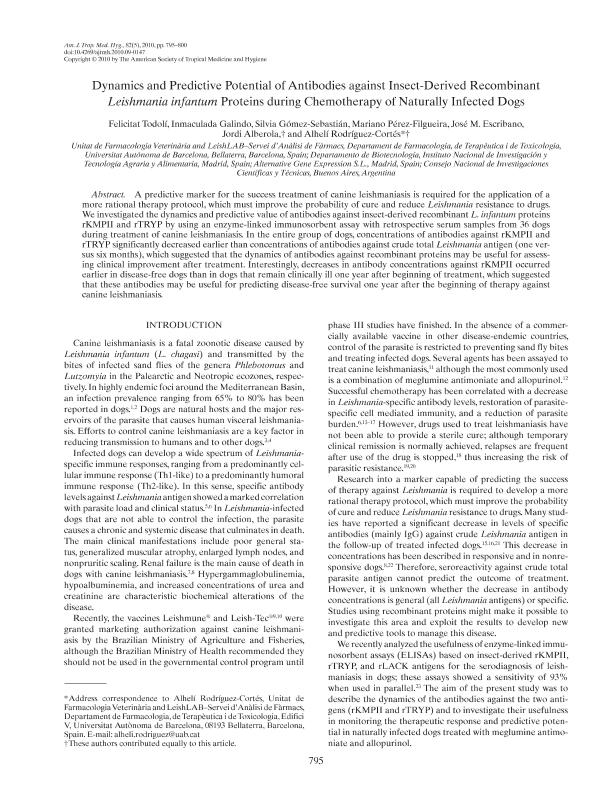Mostrar el registro sencillo del ítem
dc.contributor.author
Todolí, Felicitat
dc.contributor.author
Galindo, Inmaculada
dc.contributor.author
Gómez Sebastián, Silvia
dc.contributor.author
Pérez Filgueira, Daniel Mariano

dc.contributor.author
Escribano, José M.

dc.contributor.author
Alberola, Jordi
dc.contributor.author
Rodríguez Cortés, Alhelí
dc.date.available
2023-02-22T10:00:07Z
dc.date.issued
2010-05
dc.identifier.citation
Todolí, Felicitat; Galindo, Inmaculada; Gómez Sebastián, Silvia; Pérez Filgueira, Daniel Mariano; Escribano, José M.; et al.; Dynamics and predictive potential of antibodies against insect-derived recombinant Leishmania infantum proteins during chemotherapy of naturally infected dogs; American Society of Tropical Medicine and Hygiene; American Journal of Tropical Medicine and Hygiene; 82; 5; 5-2010; 795-800
dc.identifier.issn
0002-9637
dc.identifier.uri
http://hdl.handle.net/11336/188504
dc.description.abstract
These authors contributed equally to this article. A predictive marker for the success treatment of canine leishmaniasis is required for the application of a more rational therapy protocol, which must improve the probability of cure and reduce Leishmania resistance to drugs. We investigated the dynamics and predictive value of antibodies against insect-derived recombinant L. infantum proteins rKMPII and rTRYP by using an enzyme-linked immunosorbent assay with retrospective serum samples from 36 dogs during treatment of canine leishmaniasis. In the entire group of dogs, concentrations of antibodies against rKMPII and rTRYP significantly decreased earlier than concentrations of antibodies against crude total Leishmania antigen (one versus six months), which suggested that the dynamics of antibodies against recombinant proteins may be useful for assessing clinical improvement after treatment. Interestingly, decreases in antibody concentrations against rKMPII occurred earlier in disease-free dogs than in dogs that remain clinically ill one year after beginning of treatment, which suggested that these antibodies may be useful for predicting disease-free survival one year after the beginning of therapy against canine leishmaniasis.
dc.format
application/pdf
dc.language.iso
eng
dc.publisher
American Society of Tropical Medicine and Hygiene

dc.rights
info:eu-repo/semantics/openAccess
dc.rights.uri
https://creativecommons.org/licenses/by-nc-sa/2.5/ar/
dc.subject
LEISHMANIA INFANTUM
dc.subject
RECOMBINANT PROTEINS
dc.subject
INSECT LARVAE BIOFACTORIES
dc.subject.classification
Otras Ciencias Veterinarias

dc.subject.classification
Ciencias Veterinarias

dc.subject.classification
CIENCIAS AGRÍCOLAS

dc.title
Dynamics and predictive potential of antibodies against insect-derived recombinant Leishmania infantum proteins during chemotherapy of naturally infected dogs
dc.type
info:eu-repo/semantics/article
dc.type
info:ar-repo/semantics/artículo
dc.type
info:eu-repo/semantics/publishedVersion
dc.date.updated
2023-02-16T13:33:11Z
dc.journal.volume
82
dc.journal.number
5
dc.journal.pagination
795-800
dc.journal.pais
Estados Unidos

dc.description.fil
Fil: Todolí, Felicitat. Universitat Autònoma de Barcelona; España
dc.description.fil
Fil: Galindo, Inmaculada. Universitat Autònoma de Barcelona; España
dc.description.fil
Fil: Gómez Sebastián, Silvia. Universidad Politécnica de Madrid; España
dc.description.fil
Fil: Pérez Filgueira, Daniel Mariano. Consejo Nacional de Investigaciones Científicas y Técnicas; Argentina
dc.description.fil
Fil: Escribano, José M.. Universidad Politécnica de Madrid; España
dc.description.fil
Fil: Alberola, Jordi. Universitat Autònoma de Barcelona; España
dc.description.fil
Fil: Rodríguez Cortés, Alhelí. Universitat Autònoma de Barcelona; España
dc.journal.title
American Journal of Tropical Medicine and Hygiene

dc.relation.alternativeid
info:eu-repo/semantics/altIdentifier/url/https://www.ajtmh.org/view/journals/tpmd/82/5/article-p795.xml
dc.relation.alternativeid
info:eu-repo/semantics/altIdentifier/doi/http://dx.doi.org/10.4269/ajtmh.2010.09-0147
Archivos asociados
